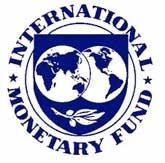Economies in sub-Saharan Africa will ride out the bumpy global recovery in the next few years to post growth rates not seen outside Asia, the IMF said in its latest economic forecasts Tuesday (16 April).
The International Monetary Fund's (IMF) latest World Economic Outlook predicted economic activity in Africa's reinvigorated economies will "remain robust" this year and next.
Regional GDP is expected to increase 5.6% in 2013, slightly lower than previously expected, but still among the fastest growth rates anywhere in the world.
Resource-rich economies like Nigeria (7.2%) and growing lower-income economies like Mozambique (8.4%) are expected to lead the way.
Only two countries, Swaziland and Equatorial Guinea are expected to see their economies shrink.
Next year an economic resurgence in South Africa is expected to push sub-Saharan growth to around 6.1%, faster than first thought.
The South African economy, hobbled along this year and last mainly because of sluggish mining production and a downturn in key eurozone export markets. SA is forecast to grow at 3.3% next year.
But, the IMF admits, the regional outlook for 2014 depends on improvements in the economic outlook for Europe and other key export markets.
External shocks
Its warning that some African economies remain vulnerable to external shocks comes as lower Chinese growth figures pummelled gold prices.
The largest drop in the precious metal's spot price in three decades sent the Johannesburg Stock Exchange down 1.6% on Monday (15 April), with many major producers taking a beating.
"The main risks to the outlook for sub-Saharan Africa stem from the external environment, although domestic security and political risks should not be discounted," the report said.
"Given the still-uncertain global economic environment, countries whose policy buffers are thin and where growth is strong should seek to rebuild their fiscal positions," it said.
The IMF said growth rates came in slightly lower than last October's forecasts because of the impact of floods on Nigerian output and labour stoppages in South Africa.
In 2012 South Africa was rocked by a series of deadly labour strikes, which mine owners estimated cost the economy around US$1.2bn.
Violent conflict also curbed growth and the IMF says this volatility remains a threat.
Oil exports from South Sudan where interrupted and the economies of Mali and Guinea-Bissau were hit by conflict.
"On the positive side, Angolan oil production strengthened, and Ivory Coast experienced a sharp rebound in economic activity after the election-related disruptions of 2011," it said.
The IMF encouraged a continuation of spending to improve infrastructure and boost production capacity, both of which have helped fuel the rise of African consumers.
On average urban Africans already spend more on apparel and food than people in Brazil, China or India, according to a recent McKinsey study.
While the price of basic goods continues to increase in many African nations, such as Nigeria and Angola, the IMF says other countries should take advantage of moderate inflation.
"The success in reducing inflation has provided room for a gradual easing of the monetary policies in several countries," it said.
Source: AFP via I-Net Bridge













































